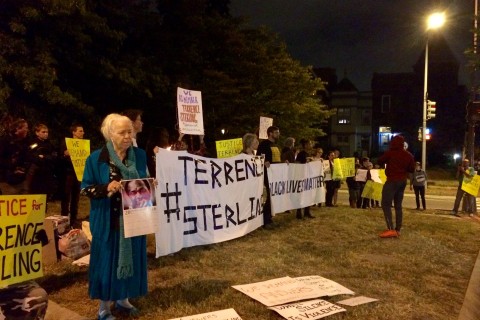WASHINGTON — Testimony continued for a second day in a disciplinary hearing that will determine whether a white D.C. police officer who fatally shot a black motorcyclist will keep his job.
Assistant Police Chief Jeffery Carroll told a panel Thursday morning that Officer Brian Trainer’s shooting of motorcyclist Terrence Sterling in 2016 was against department policy and unjustified.
Carroll — who led the department’s use-of-force review board that recommended Trainer’s firing — testified that both Trainer and his partner were responsible for “poor tactics” leading up to the shooting of the Fort Washington, Maryland, man.
It’s explicitly against department policy, Carroll said, to shoot at a moving vehicle unless there is deadly force directed at the officer. The officers also should not have tried to block the road, he told the panel.
Trainer contends that after a 25-block chase through D.C., Sterling had rammed the police car’s door with the motorcycle, and said that he feared for his life.
Later Thursday, other witnesses cast doubt on Trainer’s account, NBC Washington reported, including an accident-reconstruction expert, as well as a sergeant who testified that he saw the chase begin and that he’d radioed that the pursuit should be halted.
For the defense, an expert in police shootings testified that Trainer had every reason to fear for his life.
Trainer has been on paid leave since the Sept. 11, 2016, shooting in Northwest. It followed the chase through the District, which began over reckless riding.
“Mr. Sterling ran every single red light from 18th and Columbia Road in Adams Morgan to Third and M streets,” defense attorney James Pressler told the panel Wednesday. “He was going more than 100 miles per hour, driving on the wrong side of the road. At one point, he almost stuck another police officer.”
After officers blocked Sterling at Third and M, Trainer contends, the wheel of Sterling’s cycle was turned toward the police cruiser’s passenger side, where Trainer was sitting, pinning and injuring his legs as he tried to get out of the car. Trainer fired two rounds at Sterling, who was unarmed.
Defense lawyers asked Carroll if Sterling’s motorcycle could be considered deadly force or a threat; Carroll replied that the facts did not support that. Carroll testified that he did not think Sterling intentionally drove at Trainer, and that it appeared Sterling was just trying to get away from police.
Carroll also said that Sterling’s motorcycle was not going at a high rate of speed when it made contact with Trainer’s cruiser.
Police bodycam video (played during the hearing) showed the four-year veteran immediately after the shooting clearly saying “no” after he was asked if he was injured. The body camera was not turned on until after the shooting.
Sterling sustained wounds to his neck and side. Toxicology results later showed that his blood alcohol content was 0.16, two times over the legal limit, and that he tested positive for THC, an active ingredient in marijuana.
In August, prosecutors said they would not file criminal charges against Trainer, but Mayor Muriel Bowser then called for his resignation.
“I believe if there is no accountability in this incident, we break trust with our community,” Bowser said in her August statement.
The D.C. Police Union reiterated its support of Trainer “and his right to due process” in a statement Thursday.
“We have serious concerns about his ability to receive a fair hearing,” union officials said. “Numerous city officials have called for his resignation before the department completed its administrative investigation. Our hope is that this case is decided objectively on the merits of the evidence, not on outside political pressure.”
The disciplinary panel comprises a police commander and two captains. Testimony in the disciplinary hearing is expected to continue on Friday, when Trainer himself could testify.
Sterling’s family reached a $3.5 million settlement with the District in February.
NBC Washington Contributed to this report.








